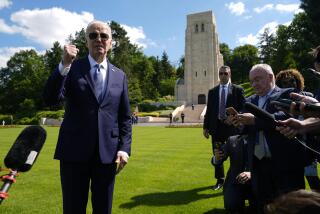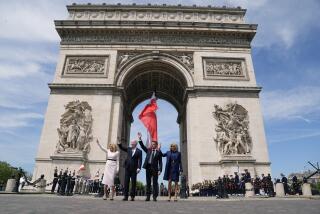The Men Behind the French ‚ÄėNon‚Äô
PARIS ‚ÄĒ It‚Äôs hard to believe, but only last summer the two-man team now leading France‚Äôs diplomatic clash with the United States was expected to improve U.S.-French relations.
President Jacques Chirac won reelection in May and installed a center-right administration after seven years of uneasy coexistence with a Socialist government that butted heads frequently with Washington. Although aloofness from the U.S. is enshrined in French politics, Chirac and his new foreign minister, an ambitious and restless intellectual named Dominique de Villepin, were considered relatively pro-American.
Chirac, 70, was the first world leader to go to ground zero after the Sept. 11 terror attacks. De Villepin, 49, speaks fluent English and spent three years as press attache at the French Embassy in Washington. Last summer, his aides indicated that he intended to tone down the diplomatic spats that had made the French-American friendship increasingly complicated.
Yet Chirac’s leadership of a global antiwar bloc culminated last week with a threat to veto a new U.N. resolution authorizing military action against Iraq. And after an emergency summit in the Azores on Sunday, the disdain with which President Bush referred to French leaders added to a stream of transatlantic vitriol that has left a more than 200-year-old alliance in real danger.
In Paris and other capitals, the personality and politics behind the high-stakes showdown are under intense scrutiny.
Fundamentally, both men seem driven by the idea that their careers have converged at a defining moment for the world and for their country. France burns with ‚Äúthe flame of a great nation eager to defend its rank,‚ÄĚ De Villepin wrote this year in the book ‚ÄúThe Cry of the Gargoyle.‚ÄĚ
The French response to the Iraq crisis resembles the strategic audacity that De Villepin espouses in general terms in the book: decisive action that ‚Äúbreaches the doors of destiny‚ÄĚ and ‚Äúsurprises the world.‚ÄĚ
That aggressive vision, combined with vast support here and around the world for France’s antiwar position, may have caused Chirac and De Villepin to underestimate the likely U.S. backlash, according to analysts.
‚ÄúChirac doesn‚Äôt see that the reading of the crisis by the Americans is very different,‚ÄĚ said Frederic Bozo of the French Institute for International Relations here. ‚ÄúI think he‚Äôs convinced about what he‚Äôs doing, but ... the conjunction of international and domestic forces has pushed him into a more radical presentation than he may have realized.‚ÄĚ
Chirac is a workhorse politician who has emphasized prudence and consensus in his 40-year career. But the post-Sept. 11 world has transformed him, like Bush, British Prime Minister Tony Blair and other leaders, into something of a gambler. He knows that the futures of France, the European Union, the North Atlantic Treaty Organization and the United Nations are all on the table.
Yet Chirac looked remarkably serene last week when he announced his intention to cast a veto in the U.N. Security Council. During a televised interview, he predicted that the U.S.-French friendship would survive.
‚ÄúThere is no risk that the American people and the French people will dispute,‚ÄĚ he said.
Asked about U.S. economic retaliation, he shook his head sagely before responding, ‚ÄúI know the Americans too well to think they would use this kind of method.‚ÄĚ
U.S. critics wonder whether French leaders have over-intellectualized their actions in a way that denies reality. Critics accuse the French of demagogic anti-American obstructionism and sneaky agendas, such as protecting oil deals and other French commercial interests in Iraq. They recall Chirac’s past contacts with Saddam Hussein: As French prime minister in the 1970s, he helped Iraq build the Osirak nuclear reactor, which was destroyed by Israeli fighter jets during a raid in 1981.
In a television appearance Sunday, Vice President Dick Cheney said that France‚Äôs policy over the years has helped Iraq deflect pressure to disarm. ‚ÄúSo it‚Äôs difficult to take the French seriously and believe that this is anything other than just further delaying tactics,‚ÄĚ Cheney said in reference to France‚Äôs latest proposals for speeded-up arms inspections by the U.N.
Chirac and De Villepin mean what they say, according to some analysts. The duo fear that war will destabilize the Middle East, trigger terrorism and impose the law of the jungle over international law. ‚ÄúSeeing the French behavior just through the prism of being anti-U.S. is to miss the point,‚ÄĚ said one Western diplomat. ‚ÄúThey truly think that the U.S. is wrong on the substance of a matter which could have an impact in the region beyond Iraq. In addition, other possible motives are launching France on the world stage and being seen as standing up to unilateral militarism.‚ÄĚ
Chirac and De Villepin have a lot in common. Both are tall, perpetually tanned charmers with famous tempers. They both profess admiration for the United States. Chirac’s enthusiasm for U.S. culture dates to his youthful travels in 1950s America, when he had a romance with a Southern belle and worked behind a counter at a Howard Johnson’s restaurant.
And Chirac has reportedly described De Villepin, who became one of his top advisors during seven years as presidential chief of staff, as the son he never had.
Chirac won reelection last year after being startled by the unexpected strength of extremist candidates. He saw himself at the peak of his career and was determined to break with the political stagnation that had disillusioned voters. De Villepin, meanwhile, had his eye on the Interior Ministry, a high-profile post overseeing law enforcement that would enhance his political future, according to analysts and diplomats.
But Chirac, who immerses himself in the details of foreign policy, wanted his trusted aide in the diplomatic post. Regardless, De Villepin has catapulted into the ranks of potential presidential candidates, according to Guillaume Parmentier, an expert at the French Institute for International Relations.
‚ÄúThe French tend to see a foreign minister as something between a politician and a technocrat,‚ÄĚ Parmentier said. ‚ÄúBut Iraq has made him into a personality. He is now mentioned in the opinion polls.‚ÄĚ
De Villepin is a telegenic version of the high-powered intellectuals who populate French government. He was born in Morocco, the son of an expatriate executive, and he learned fluent Spanish growing up in Venezuela. Like Chirac, he graduated from the National School of Administration here, a breeding ground for the French elite.
An amateur poet as well as an author, he published a book about Napoleon before writing ‚ÄúThe Cry of the Gargoyle,‚ÄĚ which analyzes France‚Äôs historic existential struggle between conservatism and revolution, ‚Äúideal and violence, Republic and Terror.‚ÄĚ In it, he paints a portrait of the ‚Äúsmoking ruins‚ÄĚ of an international landscape smoldering with fear and uncertainty after the Sept. 11 attacks.
The book is a call to arms exhorting France to renew its glory in times that demand it. De Villepin extols Joan of Arc, Charles de Gaulle and other heroes of a history ‚Äúpunctuated with dramatic moments in which we have known how to rise above ourselves.‚ÄĚ He wants France to achieve its potential as the leader of an assertive Europe that counterbalances the poles of American and Asian power.
‚ÄúDe Villepin‚Äôs approach to foreign policy is impulsive rather than cold and calculating,‚ÄĚ said Andrew Knapp, a professor of French politics at Reading University in Britain.
This hands-on approach brings risks. In January, De Villepin traveled to the Ivory Coast to broker a truce between the government and rebels in the former French colony. When disgruntled pro-government forces vented their anger in anti-French riots, he took heat.
‚ÄúHis physical involvement was risky, but it sends a message to Africans that he cares about them,‚ÄĚ said Roland Marchal of the Center for Studies of International Relations here. ‚ÄúIn six months, it may turn out that he created a mess or that it was a turning point in the crisis. That‚Äôs his style -- to be personally involved, emotionally involved.‚ÄĚ
With close supervision from Chirac, De Villepin played a lead role last fall in drafting the U.N. resolution mandating that Iraq disarm. Subsequently, however, analysts and diplomats say his high-voltage style angered Secretary of State Colin L. Powell, whom Europeans saw as the U.S. leader most sympathetic to their antiwar views.
De Villepin and Powell got along well and spoke frequently throughout the fall. But Powell, according to numerous accounts, felt ambushed by his French counterpart at a Jan. 20 meeting of the Security Council. The meeting, nominally about terrorism, took place on Martin Luther King Jr. Day. Powell was in great demand at events around the U.S. and attended the U.N. session reluctantly at De Villepin’s urging, according to Parmentier and others.
Powell grew tense as France and Germany turned the forum into a discussion of Iraq. He was furious when De Villepin used a news conference afterward to declare France’s determination to oppose war plans, according to sources.
The French view disputes the idea that De Villepin somehow ‚Äúlost‚ÄĚ Powell at a vital moment. Parmentier said Powell had already indicated at a meeting with the French foreign minister that he had converted to the camp of the hawks.
Despite the gulf of misunderstanding and resentment that now separates Paris and Washington, Chirac and De Villepin’s goal has been to reassert France’s influence and strengthen its bonds to such countries as Russia and such regions as the Middle East. In the long run, they think the Bush administration is an unusually radical government that may be weakened by war in Iraq, especially if the aftermath is messy, according to Marchal.
‚ÄúIt may be a wrong assessment, but Chirac and Villepin are looking beyond this group of neoconservatives,‚ÄĚ Marchal said. ‚ÄúThey think that the Americans, at the end of the day, will need France for anti-terrorism cooperation, trade and so on. To what extent could the U.S. government really carry off an economic boycott of France?
‚ÄúThey think maybe Bush will not do so well in terms of economic policy and a new administration could come in with more traditional thinking.‚ÄĚ
More to Read
Sign up for Essential California
The most important California stories and recommendations in your inbox every morning.
You may occasionally receive promotional content from the Los Angeles Times.










